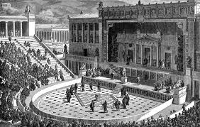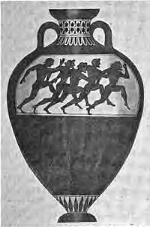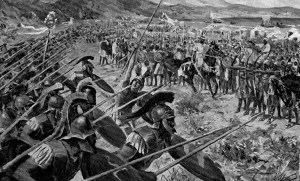Athens: Ancient Greece's Guiding Light, Dark Warning
Part 2: Arts&Culture and Wars ARTS AND CULTURE Historians Herodotus, Thucydides, and Xenophon lived in Athens, as did famed philosophers Socrates, Plato, and Aristotle. Plato's Academy and Aristotle's Lyceum were in or near Athens. 
Athens was home to the City Dionysia, the most famous of dramatic festivals, which attracted all of the top playwrights. The four most well-known–comedian Aristophanes and tragedians Aeschylus, Euripides, and Sophocles–lived in Athens for a time. The main athletics event in Athens was the Panathenaic Games, begun in 566 B.C. Like the Olympic Games, the Panathenaic Games occurred every four years. They lasted for eight days and involved athletic competitions, cultural events, and an overarching religious festival. 
Among the athletic events were boxing, pankration, pentathlon, running, and wrestling. One day was set aside for the equestrian events, which were the horse race, the chariot race, and the javelin throw on horseback. Another day of the festival involved poetry events and musical events, with participants singing or playing instruments such as the flute and the kithara. A torch race was the feature event on one day. Another day featured a boat race. Categories for competition (men only) were by age: boys 12–16, men 16–20, and men 20 and over. Event winners claimed prizes of money or special olive oil. The religious procession of participants to the Parthenon was deemed more important than the contests and involved a sacrifice of a large number of animals, and the meat was used for a huge banquet on the last night of the festivities. The focal point for these events was the Panathenaic Stadium, which was in the Agora. WARS During the period of Mycenaean domination, punctuated by the Trojan War, people in Athens and other city-states built large palaces. Athens was in the path of an invasion by the mysterious Sea Peoples in 1200 B.C. but largely escaped a Dorian invasion about the same time. 
The history of Athens was punctuated by wars, some large-scale. The most well-known conflict involving a foreign power was the Persian Wars. Athens, in particular, played a leading role in the Battles of Marathon (480 B.C.), Salamis (480 B.C.), and Plataea (479 B.C.). The influence of Athens grew after the victory over Persia, creating an Athenian Empire, administered by the Delian League. An effort to check Athens' influence led to the Peloponnesian War, which ended in a victory by Sparta and its allies. That was not the end of Athens, however. Sparta refused to destroy the city. Corinth and Thebes, two enemies of Athens in the Peloponnesian War, had had enough of Spartan dominance after 10 years and sided with Athens in the Corinthian War. Thebes was the leading power after a victory of Sparta in the Battle of Leuctra (371 B.C.), but Athens led a revolt against Theban dominance that led to the defeat of Thebes at the Battle of Mantinea (362 B.C.). All of this internal fighting made it easier for the forces of Macedon under Philip II and his son Alexander to achieve victory in 338 B.C. at the Battle of Chaeronea. Athens continued under Macedonian dominance for a time before being absorbed into the Roman sphere of influence in the 2nd Century B.C. First page > Beginnings and Government > Page 1, 2 |
|
Social Studies for Kids
copyright 2002–2026
David White




